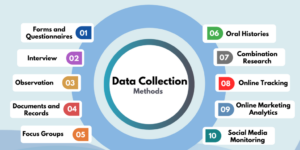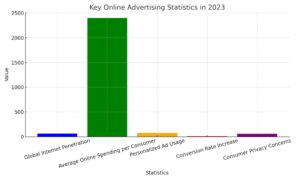Online advertising has become an essential component of modern-day marketing strategies. It is a cost-effective way to reach a broad audience and increase brand awareness. However, with the rise of digital technologies, online advertising has become more sophisticated. Personal data collection has become an integral part of the process. In today’s world, mastering online advertising through personal data collection is essential to stay ahead of the competition.
Personal data collection refers to the process of gathering information about consumers, including their demographics, interests, and online behavior. This information is then used to create personalized advertisements that are more likely to resonate with the target audience. By using personal data, advertisers can create highly targeted campaigns that are more effective and efficient, leading to a higher return on investment. However, personal data collection is not without its challenges. Consumers are becoming increasingly concerned about their privacy and the use of their personal information. Trust is a crucial factor in online advertising, and advertisers must be transparent about their data collection practices to build trust with their target audience.

The Evolution of Online Advertising
The internet has revolutionized the way businesses advertise their products and services. Online advertising has become a significant part of the advertising industry, accounting for almost 9% of all advertising in the United States. This share is expected to increase as more media is consumed over the internet and as more advertisers shift spending to online technologies.
From Banners to Big Data
In the early days of online advertising, banner ads were the primary form of advertising. The first banner ad was sold to AT&T by HotWired, a web magazine, in 1994. Display advertising has come a long way since then, with the introduction of new formats such as pop-ups, interstitials, and video ads. With the advent of big data, online advertising has become more sophisticated. Advertisers can now collect vast amounts of personal information from users, including their browsing history, search queries, and social media activity. This information is used to create user profiles that can be used to target ads more effectively.
Targeted Advertising and Personalization
Targeted advertising is a form of online advertising that uses personal information to deliver ads to specific users. This type of advertising is more effective than traditional display advertising because it is tailored to the individual user’s interests and preferences. Personalization is another form of targeted advertising that uses personal information to create a more personalized user experience. However, targeted advertising and personalization have raised concerns about privacy and the collection of personal information. Users are becoming more aware of the data that is being collected about them and are demanding more control over their personal information.
Personal Data Collection: Methods and Implications

Personal data collection is the process of gathering information about individuals through various methods, including online behavior tracking, form fills, registration data, and geolocation. Advertisers use this data to create targeted campaigns that reach specific audiences, making online advertising more effective. However, this data-driven approach raises concerns about user privacy and transparency.
Data Collection Strategies
Companies use various methods to collect personal data, including cookies, pixels, and web beacons. Cookies are small text files that websites place on users’ computers to track their online behavior. Pixels and web beacons are small images that advertisers use to track user behavior on websites. These methods allow companies to gather data about users’ interests, demographics, and location, which they use to create targeted advertising campaigns.
| Statistic | Value | Year |
|---|---|---|
| Global internet penetration rate | 63% | 2023 |
| Average online spending per consumer | $2,400 | 2023 |
| Percentage of ads using personal data | 72% | 2023 |
| Increase in conversion rates with personalized ads | 10% | 2023 |
| Consumer privacy concerns rate | 58% | 2023 |
Privacy and Transparency Issues
Personal data collection raises concerns about user privacy and transparency. Users may not be aware that their data is being collected, or they may not understand how it is being used. This lack of transparency can lead to privacy concerns and resistance from users. To address these issues, companies should provide clear and concise privacy policies that explain how they collect and use personal data. They should also provide users with privacy controls that allow them to opt-out of data collection and targeted advertising.
Consumer Attitudes and Trust
Consumer attitudes towards personal data collection are influenced by their level of trust in companies and their understanding of how their data is being used. A lack of transparency can erode trust and lead to privacy concerns. However, if companies are transparent about their data collection methods and use, they can build trust with their users. Companies that prioritize user privacy and provide clear and concise privacy policies can create a positive user experience that leads to increased engagement and loyalty.
Legal and Ethical Considerations
Legal and ethical considerations in online advertising revolve around respecting data privacy, obtaining consent for data collection, and ensuring transparency. Advertisers must follow laws like GDPR and CCPA, allowing users to access and control their data. Ethical practices involve collecting only necessary information and using it responsibly while prioritizing user trust.
Regulation and Compliance
Online advertising is a complex and rapidly evolving field, and as such, it is subject to a variety of regulations and compliance requirements. Advertisers must be aware of these regulations and ensure that they are in compliance with them. Failure to comply with these regulations can result in fines, legal action, and damage to the reputation of the advertiser. One of the most important regulations that advertisers must comply with is the General Data Protection Regulation (GDPR). This regulation, which was enacted by the European Union in 2018, requires that companies obtain explicit consent from individuals before collecting and using their personal data. Advertisers must also provide individuals with the ability to access, correct, and delete their personal data.
Ethical Practices in Data Collection
In addition to complying with regulations, advertisers must also engage in ethical practices when collecting personal data. This is particularly important in light of growing concerns about online privacy. Advertisers must be transparent about their data collection practices and provide individuals with clear information about what data is being collected, how it is being used, and who it is being shared with. One ethical practice that advertisers can engage in is data minimization. This means that advertisers should only collect the data that is necessary to achieve their advertising goals. Advertisers should also ensure that the data they collect is accurate and up-to-date. Another ethical practice is to provide individuals with the ability to opt-out of data collection. Advertisers should make it easy for individuals to opt-out of data collection, and should respect the wishes of those who choose to do so.
Maximizing the Effectiveness of Online Advertising
Effective online advertising is crucial for businesses to reach their target audience and increase sales. Personalized advertising has become a popular approach to online advertising, where firms track consumers’ shopping behaviors to provide individually personalized banners through a method called retargeting. To maximize the effectiveness of online advertising, businesses must leverage artificial intelligence, enhance user experience with personalization, and adapt to consumer perceptions.
Leveraging Artificial Intelligence
Artificial intelligence (AI) is transforming the online advertising landscape. With AI, businesses can analyze vast amounts of data to identify patterns and insights that can inform their advertising strategies. AI can help businesses identify their target audience, optimize ad placement, and personalize content to increase engagement and sales.
Enhancing User Experience with Personalization
Personalization is key to enhancing user experience and increasing engagement with online advertising. By collecting and analyzing personal data, businesses can create personalized content and recommendations that resonate with their target audience. Personalization can help businesses build stronger relationships with their customers and increase sales.
Adapting to Consumer Perceptions
Consumer perceptions of online advertising are changing. Many consumers are becoming more aware of the data that businesses collect and use to personalize their advertising. To adapt to these changing perceptions, businesses must be transparent about their data collection and use. They must also ensure that their personalized advertising is relevant, non-intrusive, and respects users’ privacy.
Frequently Asked Questions
How does personal data collection enhance online advertising strategies?
Personal data collection enables advertisers to target specific audiences with relevant ads, resulting in increased engagement and conversion rates. By collecting data on users’ browsing and purchasing history, interests, and demographics, advertisers can create more personalized and effective ad campaigns.
What are the legal implications of collecting personal data for advertising purposes?
Collecting personal data for advertising purposes is subject to various laws and regulations, including the General Data Protection Regulation (GDPR) in the European Union and the California Consumer Privacy Act (CCPA) in the United States. Advertisers must comply with these laws to ensure that user data is collected and used ethically and transparently.
What best practices should be followed to protect user privacy during data collection?
Advertisers should provide clear and concise privacy policies, obtain user consent before collecting any data, and ensure that all data is collected securely and anonymously. Advertisers should also provide users with the ability to opt-out of data collection and honor these requests.
How can advertisers ensure data accuracy and relevancy in targeted campaigns?
Advertisers should use a combination of first-party and third-party data sources to ensure data accuracy and relevancy. First-party data, such as user behavior on a website, provides valuable insights into user preferences and interests. Third-party data, such as demographic and psychographic data, can be used to supplement first-party data and create more comprehensive user profiles.
What technologies are most effective for collecting consumer data in digital marketing?
Technologies such as cookies, beacons, and tracking pixels are commonly used for collecting consumer data in digital marketing. These technologies enable advertisers to track user behavior across multiple websites and devices, providing valuable insights into user preferences and interests.
How do data collection methods impact the overall success of online advertising?
Effective data collection methods are critical to the success of online advertising campaigns. By collecting accurate and relevant data, advertisers can create more personalized and effective ad campaigns. This can result in increased engagement and conversion rates. However, advertisers must also ensure that they protect user privacy. They must also collect and use data ethically and transparently.











